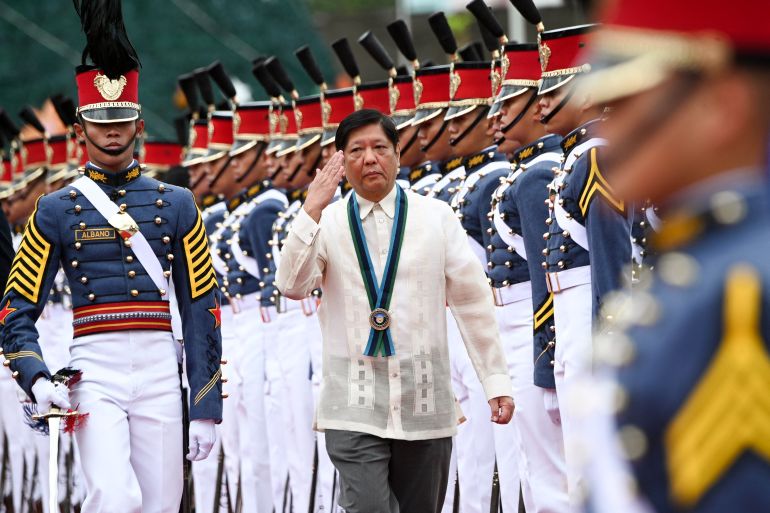Philippine President Marcos Jr visits Japan as security in focus
Philippine president and Japanese PM Fumio Kishida are expected to sign an agreement allowing for closer security ties between both nations.

Philippine President Ferdinand Marcos Jr is scheduled to arrive in Japan for a visit expected to pave the way for closer security ties between the two countries.
Marcos’s first visit on Wednesday comes after he signed an agreement last week granting the United States greater access to its military bases. It also follows a trip to Beijing last month where the Philippine president told his Chinese counterpart, Xi Jinping, that the Philippines would pursue an independent foreign policy.
Keep reading
list of 4 itemsChina, Philippines commit to peaceful South China Sea solution
ICC to resume investigation into Philippines’s deadly drug war
Philippines agrees to allow US wider access to military bases
Neil Imperial, the Philippines assistant secretary for Asian and Pacific Affairs, told a press briefing last week that Marcos wanted to “facilitate closer defence, security, political, economic and people-to-people ties” while in Japan.
That sentiment is shared in Tokyo, which has been deepening security ties with nations that view China with concern.
“As the United States deepens its relationship with the Philippines, it’s important for regional security that Japan join in,” a Japanese defence ministry told the Reuters news agency. He asked not to be identified because he is not authorised to talk to the media.
In a pre-departure speech on Wednesday, Marcos said he would cultivate “complementary interests” which “converge with those of Japan”.
“My bilateral visit to Japan is essential and is part of a larger foreign policy agenda to forge closer political ties, stronger defence, and security cooperation, as well as lasting economic partnerships with major countries in the region amid a challenging global environment,” he said.
President Ferdinand R. Marcos Jr. departed for Japan on Wednesday noon in a bid to strengthen Manila and Tokyo's collaboration in a wide range of areas, including agriculture, renewable energy, digital transformation, defense and infrastructure.
Read: https://t.co/K7J8u1DNKu pic.twitter.com/jxCZC26FjV— Presidential Communications Office (@pcogovph) February 8, 2023
Marcos and Japanese Prime Minister Fumio Kishida are expected to sign an agreement on disaster relief that would facilitate joint drills in humanitarian assistance provision, according to The Japan Times. That agreement is seen as a possible first step towards establishing a broader legal framework that would allow Japanese forces to deploy to the Philippines more easily under a reciprocal access agreement, which sets out the legal status for visiting troops, The Japan Times reported.
“This is a significant strategic reshuffling,” US Ambassador to Japan Rahm Emanuel said last week, referring to US-Japan-Philippine defence ties.
It “would be a major contribution to the strategic alignment in the area from a deterrence standpoint”.
A year ago, Japan and Australia signed a visiting forces agreement, allowing them to deploy forces on each other’s soil, with Tokyo concluding a similar accord with the United Kingdom last month.
Those deals provide a framework for how Marcos and Kishida could also forge deeper military ties to counter their common adversary, say experts.
Japan plans to double its defence spending in the next five years, and Kishida’s government in December adopted key security and defence upgrades, including a counterstrike capability that breaks from Japan’s self-defence-only post-war principle.
Japan will also use its development assistance budget to support poorer nations as they strengthen their maritime safety and other security capabilities.
Japan’s Foreign Minister Yoshimasa Hayashi said it was “indispensable for Japan to not only fundamentally reinforce its own defence power but also to improve the deterrence capability of like-minded countries” and prevent one-sided changes to the status quo.
“The Philippines is a critical security partner for Japan,” said Narushige Michishita, a professor at the National Graduate Institute for Policy Studies in Tokyo. “Any conflict in the Taiwan Strait would make the Philippine Sea strategically important,” he added.
Taiwan, which lies between Japan and the Philippines, has become a focal point of intensifying Chinese military activity that Tokyo and Washington worry could escalate into war as Beijing tries to capture what it views as a rogue province.
A Japanese military presence in the Philippines could also help Marcos counter Chinese influence in the South China Sea, much of which Beijing claims, including territory that Manila considers its own.
Marcos has promised not to lose an inch of territory in the strategic waterway, through which $3 trillion in ship-borne trade passes annually.
Beijing has said its intentions in the region are peaceful.